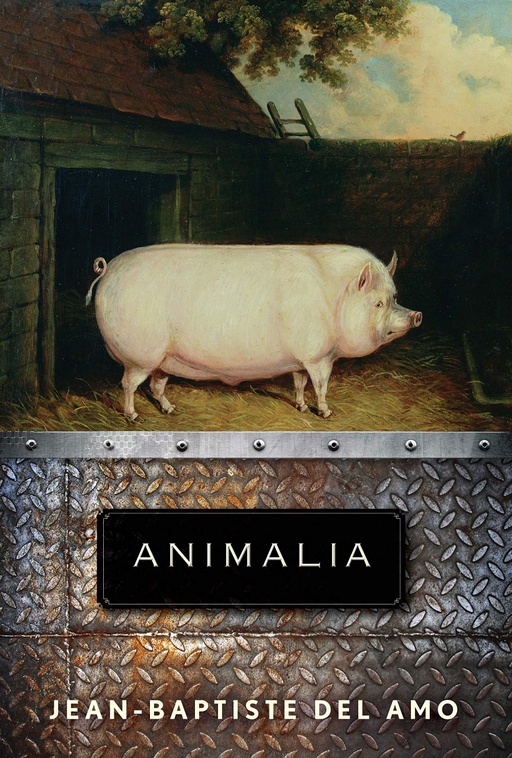Year of the Pig
My original concept for this book review was to recommend three novels to mess up your holiday dinner.
Here’s how it would work: I recommend the novels; you read one or more of them; and then, moved by the emotional sensation of reading contemporary fiction, you’d be moved to stir it up at the family table.
“Oh, is that a holiday ham? Let me tell you about factory farming."
“That’s a really nice salad, thanks! Do you realize that our food supply is threatened by petrochemical fertilizers and contaminated groundwater?"
“Wow, thank you for preparing a meal for so many guests. I realize how much unpaid, underappreciated domestic labor it takes to run a household."
But I’m having second thoughts. Why contribute to the decline in civility? Why spoil everything?
The pig’s dead, the salad’s fresh, and the housework’s done. Go ahead, enjoy yourself. Pig out. Drink up. Reminisce. Anesthetize yourself with a movie about space aliens, cats, popes, princesses, whatever you need. Tell yourself everything’s fine.
Once that’s all done, maybe start off the new year with one of these books.
Jean-Baptiste de Amo’s novel Animalia is a multigenerational story that follows a family farm in rural France in the years before and during World War I and then to the factory farm it later became.
I’ve read more than a few war stories, but this is the first time I’ve seen a depiction of the Western Front centering the experience of cows and pigs. Requisitioned by the army, the animals are loaded into railcars, put into cattle pens, and butchered within a horrible, makeshift abattoir:
An animal that struggles in a last desperate attempt at survival must be hobbled and hit repeatedly with a lump hammer until the bones of the cranium sunder and the brain is reduced to a pulp that spurts from the ears as the animal falls on its flank and dies, shuddering, on a bed of still-warm entrails.
Praise the Lord and Pass the Ham-munition!
In the latter part, the book jumps ahead to the 1980s, when Éléanore’s descendants operate a factory farm dedicated to pig-rearing. The humans still have a miserable and joyless existence even in modernity, and the fetid lives of the pigs are shaped entirely by the global market:
They have created hulking beasts that are also sickly, animals that have no life beyond the hundred and eighty-two days spent vegetating in the half-light of a pig unit, with hearts and lungs that beat and oxygenate the blood only to constantly produce more lean meat for consumption.
With its claustrophobic rural setting and religious allegory contrasted with pagan ritual, Animalia has the feel of a classic novel, and yet it also speaks to our contemporary moment with a sharp critique of the slaughterhouse industry, one of many in the global economy operating in opacity without regard for future generations.
It’s not light reading, but if you can handle an unceasing trickle of bodily fluids, it’s worth your time and effort.
Nell Zink’s novel Doxology gives us another multigenerational family tale, this one starting in New York City’s downtown music scene in the 1980s.
Pam grew up in D.C. She’s into Minor Threat and has plastered pictures of Ian MacKaye all over her childhood bedroom. Daniel’s from the Midwest, an eighties hipster from a family of born-again Christians. Joe is preternaturally kind and free-spirited, he can talk to anyone, he’s a Sonic Youth completist, and it turns out he’s rock-star charismatic.
Pam and Daniel meet-cute at Joe’s place:
Joe had a visitor. As he was letting her in the apartment door, a man emerged from the bedroom with a square sheet of black plastic in his hand and said, “Hey, man, you have the Sassy Sonic Youth flexi!"
“I subscribed to that magazine the second I heard of it," Joe said.
“It’s not long for this world," Pam said, hanging up her coat. “What's the demographic supposed to be — thirteen-year-old girls who fuck? Advertisers really go for that."
“Nice to meet you," the stranger said, stepping forward and holding out his hand. “Daniel Svobody."
“Pam Diaphragm," she said. “Sassy is the dying gasp of straight mainstream pedophilia." “I read it for the political coverage," Daniel said, satirizing the readers of Playboy.
First, what kind of friend shows up at your place, rifles through your bedroom, and comes out waving around one of your rarest collectibles? Ugh. Come on, Svobody, I thought you were from the Midwest. (Oh, and the nternet says it was vinyl, not a flexi.)
Second, did people in the 1980s typically introduce themselves in casual settings using full names or stage names? No, that only happens within an awkward expository passage.
Third, speaking of awkward exposition, I don’t get Pam’s beef with Sassy. Was she lamenting that Sassy was too sassy to survive in an advertiser-driven media landscape? Or did Sassy cater to the male gaze by doing a cross-promotion with a band beloved by (often male) music nerds? Or is Pam saying that Sassy's celebrated, forthright editorial stance groomed children for abuse? Or is she just being needlessly provocative? I must be missing something, because the Sassy-bashing doesn’t make sense to me as commentary from either author or character.
Fourth, the classic Playboy punchline was: “I read it for the articles." And why gloss the joke?
Despite my objections, Pam and Daniel become a couple. They have a daughter, Flora. They both work while Joe babysits.
They start a band, fronted by Joe, but it’s rough going. Tower Records won’t carry their album, they mangle the audition at CBGB, and they scrounge for opening spots with more successful bands. But in a clever move, they start a music label for the sole purpose of signing other bands that will allow Joe’s band to open for them. This is my favorite aspect of the novel, the mastering-the-hustle clamor for an audience, those realistic details that draw on Zink’s past as a zine publisher.
Fast-forward to Washington, D.C., and it’s a timeline adjacent to and only slightly worse than our own. Flora’s all grown up, imbued with the coolest parenting Gen X has to offer. She’s working on a soil erosion control project in Ethiopia, where her fellow aid workers disabuse her of her idealism:
Imagine a lush and beautiful meadow, rich with grain and the humming of bees. Now mow it six hundred times a year for five thousand years until it has been progressively converted into small, round, hard pellets of desiccated fecal matter, indistinguishable from the sand on which they rest. Pure silica. That's Ethiopia. Its soil is a collective hallucination.
The so-called solution for Ethiopian soil would involve the same unsustainable stopgaps being used in “the degraded sandy cornfields of the United States": “If you dumped enough petrochemical fertilizers and groundwater on it, it would be sprouting monster corn ears and onions and tomatoes…"
Reaching the conclusion that our global food supply depends upon an unsustainable supply of rapidly depleting resources, Flora realizes that any meaningful effort to prevent environmental collapse must be political, and so she volunteers for the Green Party to canvass for Jill Stein in the run-up to the 2016 election.
Yet she also maintains close ties to the Democratic Party, as represented by her relationship with two avatar-like characters: Aaron, the young and hopeful party loyalist who gives his entirety to his unreasonably optimistic coworkers, and Bull, the weathered political operative who isn’t afraid to run a dirty campaign.
Will Flora find happiness with either of these two men? And by the blunt analogy, does a deeply committed environmentalist have a future in the Democratic Party?
Sure, when pigs fly.
“Any fool knows a dog needs a home/And shelter from pigs on the wing" — Pink Floyd, Animals, “Pigs on the Wing (Part Two)"
In Desde la sombra, by Juan José Millás (available in English as From the Shadows, translated by Thomas Bunstead and Daniel Hahn), we meet Damián Lobo being interviewed before a live studio audience by Sergio O’Kane, the host of a wildly popular television program.
Damián once had a solid job as a maintenance manager, supervising installations and managing repairs for an entire company. But then the company brought contractors to do parts of his work, and then most of his work, and then all of his work, and then he was let go with a severance payment. Damián was also made redundant within his family, his parents preferring his older, adopted sister ahead of him, the accidental second child.
He tells all this to Sergio O’Kane, but in reality, Damián is sitting in a cafeteria drinking a cup of tea, and Sergio O’Kane and the entire show are all figments of his imagination created to occupy the long stretches between his infrequent interactions with the outside world.
Soon, Damián’s inventions reinvent him.
Damián pops into an antique market and spots a monogrammed tie clip — “S.O." for Sergio O’Kane — which he decides to steal as a gift for his imaginary interlocutor. Busted by a security guard, he escapes by hiding in a massive antique wardrobe. Just his luck, the wardrobe had just been sold, and so with Damián hiding inside, it’s wrapped up with tape, lifted onto a truck, and driven out to the suburbs of Madrid to be installed in the bedroom of a married couple with a teenage daughter.
Damián hides out, stays quiet, and bides his time. He likens himself to an eel blending in with the landscape. He listens and waits, learning the habits of the family. The husband, Fede, owns his own store selling electronic toys, and so usually he’s out until late. The wife, Lucía, takes their daughter to school, and then goes to work for a businessman who owns service stations and a chain of artisanal bakeries. Nobody’s back home until mid-afternoon.
That leaves Damián alone all day, and he quickly makes himself comfortable, expanding his domestic zone from the wardrobe into an adjoining built-in closet. Then he does the dishes, vacuuming, laundry, and the rest of the household chores. The husband and daughter fail to see any difference in the supply of domestic labor, but Lucía certainly notices. She convinces herself that it’s a ghost lending a helpful hand, and Damián does his best to confirm her beliefs. They settle into a routine.
Sergio O’Kane asks Damián the obvious question:
¿Y no sintió claustrophobia?
*—No, al contrario, jamás me había sentido tan libre. Como si aquel armario fuera el centro del universo, como si el mundo se expandiera a partir de él…*
—Didn’t you feel claustrophobic?
—————No, on the contrary, I had never felt so free. It’s as if the wardrobe were the center of the universe, as if the world were expanding from within it...
You can poke holes in the plot, but Millás has come up with an original conceit for a fable of survival in a consumerist society, el capitalismo sin alma, capitalism without a soul.
And just you wait, it won’t be long before we see Amazon Lobo (in partnership with Ikea) or Uber Eel (by Herman Miller) offering to install a low-paid contingent laborer in your home, housed within a micro-mini housing unit camouflaged behind a lovely piece of furniture. You’ll have your very own friendly ghost, emerging during the day to perform household tasks when you’re not home, and then disappearing into the furniture at night — completely quiet and invisible to you and your family.
Yeah, don’t go anywhere near these books for a couple weeks. They’ll wait until next year, along with the reckoning that always follows piggish consumption without care of consequences.
Happy holidays!
Ivan writes shelf talkers for Mercer Street Books. You can also find
him at
www.ivantohelpyou.com.
Follow on Twitter
Other recent reviews
Talk about the weather
-
Interpretative Guide to Western-Northwest Weather Forecasts
March 27, 2018
72 pages
Provided by publisherBuy on IndieBound
The man show
-
The Sexiest Man Alive
October 01, 2018
72 pages
Provided by publisherBuy online
Accidentally honest
-
The Shame of Losing
October 01, 2018
264 pages
Provided by authorBuy on IndieBound


